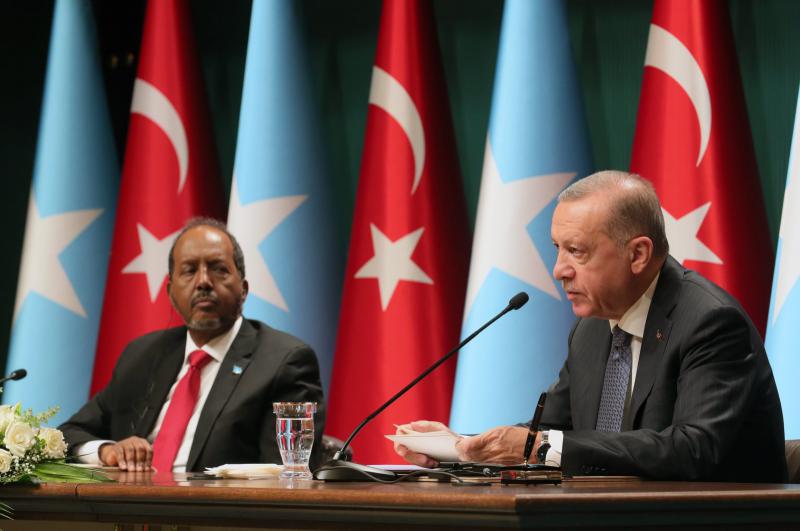

ISTANBUL –
Turkey signed an offshore oil and natural gas cooperation deal with Somalia on Thursday, the Turkish energy ministry said, further strengthening bilateral ties after agreeing a defence deal last month.
Over the few last years, Turkey has managed to take advantage from the complex situation that Somalia has been going through, accelerating its efforts to provide military and economic support to Mogadishu, in a way that opens the path for Ankara to exploit Somalia’s energy resources.
The Turkish energy ministry said the offshore oil and natural gas deal, which it described as an inter-governmental agreement, includes exploration, evaluation, development and production of oil in Somalia’s land and sea blocks.
“With this agreement, we will carry out joint activities to bring the resources of Somalia to the Somali people. We aim to strengthen Turkey’s presence in the Horn of Africa with new collaborations in the field of energy,” Turkish Energy Minister Alparslan Bayraktar said on social media platform X.
“Oil and natural gas exploration offshore of Somalia, and it looks more like oil for now, will start very soon in the areas we have identified. We will maybe send our seismic (exploration) vessel there in the first phase,” he said separately in a panel, without elaborating.
The deal includes transportation, distribution, refining, sales and services operations of oil and other products from land and sea projects, the ministry also said.
Ankara has become a close ally of the Somali government. It has built schools, hospitals and infrastructure and provided scholarships for Somalis to study in Turkey.
In 2017, it opened its biggest overseas military base in Mogadishu. Turkey also provides training to Somali military and police.
In February, Ankara signed a defence and economic cooperation agreement with Somalia and will provide maritime security support to help the African country defend its territorial waters.
Under the ten-year defence agreement, Turkey, a member of NATO and a close ally of Somalia, will help defend the Somali coast and reorganise the troubled country’s naval forces in the Horn of Africa, according to what Somali President Hassan Sheikh Mohamud said at the time.
Observers believe that Turkey’s strategy to contain Somalia has succeeded, especially after declaring Ankara’s support for Mogadishu in the recent dispute with Ethiopia over the memorandum of understanding with Somaliland that gives Addis Ababa access to the Red Sea and the establishment of a military base.
Last May, the Anadolu news agency published a report on oil opportunities in Somalia in which it said, “Reserves of around 30 billion barrels of oil in 15 offshore blocks would completely change the face of Somalia, especially since these reserves are equivalent to three times those found in Algeria and place the country third in Africa after Libya and Nigeria.”
The report added that Somalia is at a turning point in its history, after it has begun to attract the interest of international companies for oil exploration, especially in the areas off its longest coast in Africa, overlooking the Indian Ocean, the Arabian Sea and the Gulf of Aden, and is even on the key sea route for international trade between Asia and Europe.
The report showed that Turkey had its eyes on Somali oil in exchange for the range of support it was providing Mogadishu at a time when Western countries, especially the United States, had abandoned the country.
According to 2D seismic conducted by TGS in 2014, there could be 30 billion barrels of crude across 15 blocks initially offered by Somalia’s government. However, Richard Anderson, CEO of Coastline Exploration, says, “There is the possibility that there are tens of billions of barrels that could be extracted, or even more that could emerge over time.”
Somalia is a promising country in terms of oil reserves expected to be explored, whether on land or at sea. Sufficient seismic studies have not yet been conducted to determine confirmed oil reserves across the country.
The Somali president hopes to accelerate the process of oil production and export, and this was evident after a quick approval of the first agreements signed by Coastline Company in February 2022, to explore in seven offshore blocks covering 35 thousand square kilometres.
Sheikh Mohamud also signed various agreements with local districts to avoid disputes over sharing oil revenues and local development. Since his election in May 2022, the new Somali president has visited several countries to encourage investment in Somalia’s oil sector, similar to Turkey.